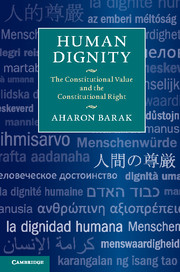Book contents
- Frontmatter
- Contents
- Preface
- Acknowledgements
- Table of Cases
- Part I Fundamental concepts and sources
- Part II Human dignity as a constitutional value
- 5 Purposive constitutional interpretation
- 6 The role of human dignity as a constitutional value
- 7 Three types of model for determining the content of the constitutional value of human dignity
- Part III Human dignity as a constitutional right
- Part IV Human dignity in comparative law
- Bibliography
- Index
- References
7 - Three types of model for determining the content of the constitutional value of human dignity
Published online by Cambridge University Press: 05 February 2015
- Frontmatter
- Contents
- Preface
- Acknowledgements
- Table of Cases
- Part I Fundamental concepts and sources
- Part II Human dignity as a constitutional value
- 5 Purposive constitutional interpretation
- 6 The role of human dignity as a constitutional value
- 7 Three types of model for determining the content of the constitutional value of human dignity
- Part III Human dignity as a constitutional right
- Part IV Human dignity in comparative law
- Bibliography
- Index
- References
Summary
Theological models, philosophical models and constitutional models
The key question before us is: what is the content of human dignity as a constitutional value? What is the normative message that emanates from this constitutional value? The long intellectual history of the social value of human dignity serves as a rich source from which we can draw two important models for understanding the constitutional value of human dignity. One model is the theological model. The other model is the philosophical model. In my opinion, these two models cannot provide a satisfactory basis for human dignity as a modern constitutional value. I would like to propose a third, distinct model, based upon a constitutional approach to human dignity.
The approach of each of the three models is different from that of the others. However, at times there is no great difference in the results to which each of the three models leads. We have before us a Rawlsian phenomenon of “overlapping consensus.”
Theological models
The theological models incorporate various – and at times opposing – views of theologians dealing with human dignity. Common to all of them is the desire to grant the constitutional value of human dignity the meaning assigned to human dignity in the framework of religion. Every religion has its own way of viewing human dignity. Our focus here is upon Judaism and Christianity.
- Type
- Chapter
- Information
- Human DignityThe Constitutional Value and the Constitutional Right, pp. 114 - 136Publisher: Cambridge University PressPrint publication year: 2015



